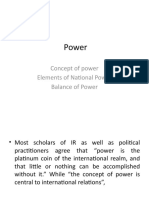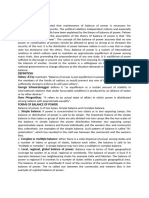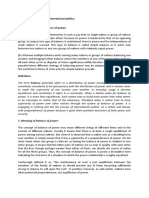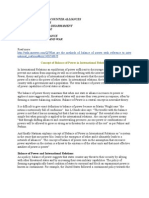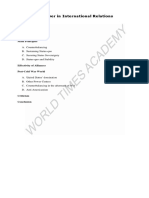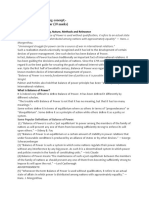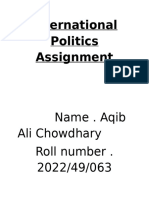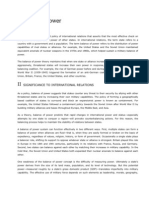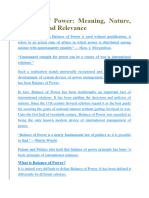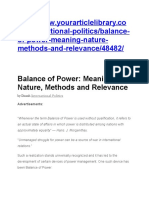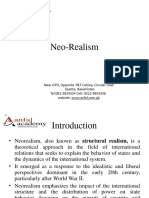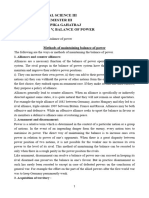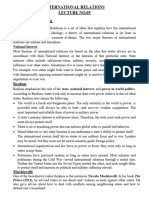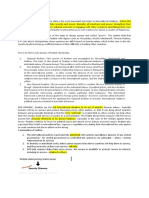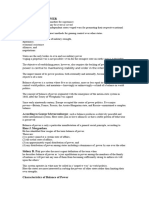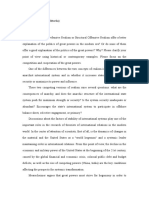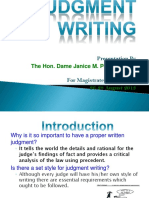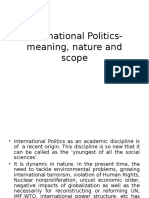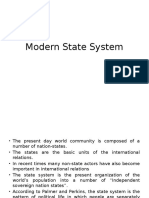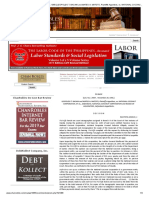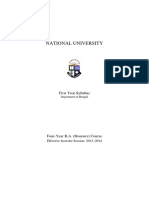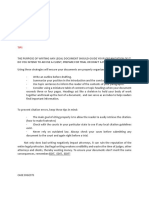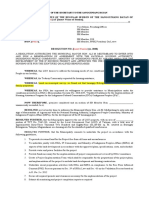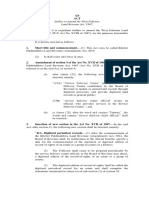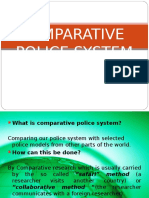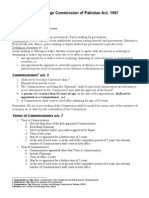0 ratings0% found this document useful (0 votes)
234 viewsBalance of Power - Summary
Balance of Power - Summary
Uploaded by
Kiran KumarThe document discusses the concept of balance of power in international relations. It refers to a distribution of capabilities among rival states that prevents any one state from dominating the others and imposing its will. A balance of power is maintained through alliances that counterbalance threats from stronger states. Historically, Britain played this role in Europe, and during the Cold War the US and Soviet Union balanced each other's nuclear capabilities. The document outlines how balance of power theory applies to international politics and security issues today.
Copyright:
© All Rights Reserved
Available Formats
Download as PPTX, PDF, TXT or read online from Scribd
Balance of Power - Summary
Balance of Power - Summary
Uploaded by
Kiran Kumar0 ratings0% found this document useful (0 votes)
234 views8 pagesThe document discusses the concept of balance of power in international relations. It refers to a distribution of capabilities among rival states that prevents any one state from dominating the others and imposing its will. A balance of power is maintained through alliances that counterbalance threats from stronger states. Historically, Britain played this role in Europe, and during the Cold War the US and Soviet Union balanced each other's nuclear capabilities. The document outlines how balance of power theory applies to international politics and security issues today.
Original Title
balance of power - summary.pptx
Copyright
© © All Rights Reserved
Available Formats
PPTX, PDF, TXT or read online from Scribd
Share this document
Did you find this document useful?
Is this content inappropriate?
The document discusses the concept of balance of power in international relations. It refers to a distribution of capabilities among rival states that prevents any one state from dominating the others and imposing its will. A balance of power is maintained through alliances that counterbalance threats from stronger states. Historically, Britain played this role in Europe, and during the Cold War the US and Soviet Union balanced each other's nuclear capabilities. The document outlines how balance of power theory applies to international politics and security issues today.
Copyright:
© All Rights Reserved
Available Formats
Download as PPTX, PDF, TXT or read online from Scribd
Download as pptx, pdf, or txt
0 ratings0% found this document useful (0 votes)
234 views8 pagesBalance of Power - Summary
Balance of Power - Summary
Uploaded by
Kiran KumarThe document discusses the concept of balance of power in international relations. It refers to a distribution of capabilities among rival states that prevents any one state from dominating the others and imposing its will. A balance of power is maintained through alliances that counterbalance threats from stronger states. Historically, Britain played this role in Europe, and during the Cold War the US and Soviet Union balanced each other's nuclear capabilities. The document outlines how balance of power theory applies to international politics and security issues today.
Copyright:
© All Rights Reserved
Available Formats
Download as PPTX, PDF, TXT or read online from Scribd
Download as pptx, pdf, or txt
You are on page 1of 8
Balance of Power
In International Relations an equilibrium of power
sufficient to discourage or present one nation or
prevent one nation from imposing its will on or
interfering with the interests of another.
Balance of Power, theory and policy of international
relations that asserts that the most effective check
on the power of a state is the power of other states.
In international relations, the term state refers to a
country with a government and a population.
The term balance of power refers to the distribution
of power capabilities of rival states or alliance
The balance of power theory maintains that when one state or
alliance increases its power or applies it more aggressively;
threatened states will increase their own power in response, often
by forming a counter-balancing coalition.
Balance of Power is a central concept in neorealist theory.
It is difficult to give exact definition to balance of power because as
Martin Wright says the notion is notoriously full of confusions.
L.Claude also says: The trouble with the balance power is not that
it has no meaning but that it has too many meanings
But essential idea is very simple but when principle is applied to the
international relations , the concept of power means that through
shifting alliances and countervailing pressures ,no one power or
combinations of powers will be allowed to grow so strong as to
threaten the security of the rest as per Palmer and Perkins.
And finally Hartman explains concept of Balance of Power in
International Relations as a system in the sense that one power bloc
leads to the emergence of other and it ultimately leads to a network of
alliances.
The concept of balance of power rests on the assumption that excessive
power anywhere in the system is a threat to the existence of the other
units and that most effective antidote of power is power
Balance of Power and International Relations
As a policy, balance of power suggests that states counter any threat to
their security by allying with other threatened states and by increasing
their own military capabilities.
The policy of forming a geographically based coalition of states to
surround and block an expansionist power is known as containment.
For example, the United States followed a containment policy towards
the Soviet Union after World War II by building military alliances and
bases throughout Europe, the Middle East, and Asia.
A Balance of power system can functions effectively in two
different ways:
1. Multiple states can form a balance of power when alliances are fluid
that is, when they are easily formed or broken on the basis of expediency,
regardless of values, religion, history, or form of government.
Occasionally a single state plays a balancer role, shifting its support to
oppose whatever state or alliance is strongest. Britain played this role in
Europe in the 18th and 19th centuries, particularly in its relations with
France, Russia, and Germany.
2. Two states can balance against each other by matching their increases
in military capability. In the Cold War, the Soviet Union and United States
both expanded their nuclear arsenals to balance against each other.
One weakness of the balance of power concept is the difficulty of
measuring power. Ultimately a states power derives from the size of its
land mass, population, and its level of technology. But this potential power
measured roughly by a states gross domestic product (GDP)translates
imperfectly into military capability.
The effective use of military force depends on such elements as leadership,
morale, geography, and luck. Furthermore, leaders misperceptions can
seriously distort the calculation of power. During the Vietnam War (1959-
Balance of Power Today
The collapse of the Soviet Union in 1991 left the United States as the
worlds sole superpower.
Balance of power theory suggests that without the Soviet threat the
United States, as the dominant world power, will face difficulties in its
relations with such states as China and the European powers.
For example, key countries such as China, Russia, France, and Germany all
opposed the United States invasion of Iraq in 2003 in diplomatic arenas
such as the United Nations.
Yet this opposition did not stop the United States from acting, exposing the
significant gap in military capability that now exists between the United
States and the rest of the world.
Small states that fear the United States are no longer able to join a
counterbalancing coalition to protect their security. Instead, many are
developing nuclear weapons in an attempt to dramatically expand their
military capability. For example, North Korea claimed in 2003 that it was
developing nuclear weapons to balance against U.S. power.
The changing nature of power in the contemporary international
system further complicates the operation of the global balance of
power.
Globalization, the Internet, weapons of mass destruction, and other
technological developments have made it possible for small states
and even non state groups to acquire significant power.
These factors also dilute the relative importance of military power. For
example, after the terrorist attacks of September 11, 2001, the United
States assembled a broad coalition to invade Afghanistan, using
military force to topple the Taliban government and end the Talibans
support for al-Qaeda terrorists.
This application of military power did not provoke a balancing coalition
of other states, but it also did not end the terrorist threat to the United
States. In the future, the balance of power may continue to operate
among states engaged in prolonged disputes, but it is less applicable
to conflicts involving terrorists and other non state groups.
Conclusion
The balance of power has been a central concept in the theory and practice of
international relations for the past five hundred years.
It has also played a key role in some of the most important attempts to
develop a theory of international politics in the contemporary study of
international relations.
Another basis for the realist theory is the idea of a balance of power and the
anarchic nature of the global system as there is no effective global
government and the world system is anomic (without rules).
This ties in well with the idea of global relations being one of self help and
each state striving to promote its own interests at the expense of others. In
short, realists see the global system as one of self help.
The idea of the balance of power is put in place to explain the situation where
states will ally themselves to prevent the hegemony of one state over all
others.
Balance of Power, theory and policy of international relations that asserts that
the most effective check on the power of a state is the power of other states.
You might also like
- Balance of Power in International RelationsDocument8 pagesBalance of Power in International RelationsAnkit YadavNo ratings yet
- The Paradox of Hegemony - Cronin - 2012 PDFDocument28 pagesThe Paradox of Hegemony - Cronin - 2012 PDFazardarioNo ratings yet
- Persons Reviewer (Tolentino)Document57 pagesPersons Reviewer (Tolentino)Stephanie Valentine100% (3)
- Non-Joinders and Misjoinder of Parties in Civil SuitDocument15 pagesNon-Joinders and Misjoinder of Parties in Civil SuitHemantVerma100% (1)
- Pecson V MediavilloDocument4 pagesPecson V MediavilloHiezll Wynn R. RiveraNo ratings yet
- 004 Balance of PowerDocument24 pages004 Balance of PowerIrfanullah IrfaniNo ratings yet
- Balance of PowerDocument12 pagesBalance of PowersaharshreddyNo ratings yet
- IR 5 PowerDocument14 pagesIR 5 PowerMaleehaNo ratings yet
- AssignmentDocument6 pagesAssignmentMaleehaNo ratings yet
- 4.2: International System of PowerDocument12 pages4.2: International System of Powerfatima aghaNo ratings yet
- Balance of PowerDocument12 pagesBalance of PowerRose ChuchaNo ratings yet
- Balance of Power in The International PoliticsDocument7 pagesBalance of Power in The International PoliticsImti LemturNo ratings yet
- IRDocument6 pagesIRRicky DulayNo ratings yet
- Balance of PowerDocument25 pagesBalance of Powerdaanunair2013No ratings yet
- AM IV - Study MaterialDocument4 pagesAM IV - Study MaterialHAWK KUNÀLNo ratings yet
- LSN FOUR - BOP Methods and RelevanceDocument6 pagesLSN FOUR - BOP Methods and RelevanceBetty MudondoNo ratings yet
- IR Lecture 1 Lyst3291Document11 pagesIR Lecture 1 Lyst3291sonu insa 1No ratings yet
- Polarity in International RelationsDocument8 pagesPolarity in International RelationsDevita Eka Sari50% (2)
- GA - Lecture 5 - Structural - RealismDocument29 pagesGA - Lecture 5 - Structural - RealismsaudaminiNo ratings yet
- Power Politics: Rudresh Kumar Singh and Sakshi Malhotra (Students of 2Nd Sem, B.A. LL.B)Document25 pagesPower Politics: Rudresh Kumar Singh and Sakshi Malhotra (Students of 2Nd Sem, B.A. LL.B)RUDRESH SINGHNo ratings yet
- Pol Sci Pro 2Document13 pagesPol Sci Pro 2Ananya sahuNo ratings yet
- International Politics Concepts Theories and Issues 2nd Edition Basu Solution ManualDocument15 pagesInternational Politics Concepts Theories and Issues 2nd Edition Basu Solution Manualdennis100% (36)
- Power: Unit 4.1: Definition and Basic Tenets of PowerDocument14 pagesPower: Unit 4.1: Definition and Basic Tenets of Powerfatima aghaNo ratings yet
- Lecture 8Document32 pagesLecture 8Altantuya DashnyamNo ratings yet
- Balance of PowerDocument6 pagesBalance of PowerismailjuttNo ratings yet
- Power in Po - 1678332072909Document3 pagesPower in Po - 1678332072909Kuagilo Gils-onNo ratings yet
- Balance of PowerDocument21 pagesBalance of PowerHaider AliNo ratings yet
- Lecture 4 2Document9 pagesLecture 4 2Sameen JavedNo ratings yet
- PS-302: International Politics: Theory and PracticeDocument4 pagesPS-302: International Politics: Theory and Practiceamit boidyaNo ratings yet
- Write A Note On Following Concept - Power/Balance of Power (10 Marks)Document7 pagesWrite A Note On Following Concept - Power/Balance of Power (10 Marks)Mehtab ChudharyNo ratings yet
- PowerDocument3 pagesPowerThe BookManNo ratings yet
- World Peace: Issues And: PerspectivesDocument22 pagesWorld Peace: Issues And: PerspectivesArslan TanveerNo ratings yet
- Poltical Science AssignmentDocument6 pagesPoltical Science AssignmentAqib AliNo ratings yet
- Balance of PowerDocument4 pagesBalance of Powerduakamal57No ratings yet
- Balance of PowerDocument28 pagesBalance of PowerRose ChuchaNo ratings yet
- Balance of PowerDocument3 pagesBalance of PowerpritymNo ratings yet
- I.R Chapter 2Document7 pagesI.R Chapter 2mariamo IoselianiNo ratings yet
- 802U2Bipolar - Unipolar - MultipolarDocument26 pages802U2Bipolar - Unipolar - Multipolarपरशुराम एक शिवभक्तNo ratings yet
- Balance of PowerDocument15 pagesBalance of PowerRoopeshNo ratings yet
- Balance of Power: Meaning, Nature, Methods and RelevanceDocument29 pagesBalance of Power: Meaning, Nature, Methods and RelevanceNadeem BaLoch100% (1)
- Waltz 1979, p.123 Waltz 1979, p..124 Waltz 1979, p.125 Waltz 1979, p.125 Waltz 1979, p.127Document5 pagesWaltz 1979, p.123 Waltz 1979, p..124 Waltz 1979, p.125 Waltz 1979, p.125 Waltz 1979, p.127TR KafleNo ratings yet
- Balance of Power IRDocument21 pagesBalance of Power IRKashif Ali Raza100% (1)
- Jablonsky National PowerDocument18 pagesJablonsky National PoweredumanocuNo ratings yet
- Balance of PowerDocument26 pagesBalance of PowerKumar NaveenNo ratings yet
- Neo RealismDocument14 pagesNeo RealismatifakhankakarNo ratings yet
- Balance of PowerDocument19 pagesBalance of Powersaloni garg100% (1)
- Unit 1Document7 pagesUnit 1Mouga MaevaNo ratings yet
- Subject: Political Science Iii Course: Ba LLB Semester Iii Teacher: Ms. Deepika Gahatraj Module: Module V, Balance of PowerDocument3 pagesSubject: Political Science Iii Course: Ba LLB Semester Iii Teacher: Ms. Deepika Gahatraj Module: Module V, Balance of Powerlokie4093No ratings yet
- Power Transition TheoryDocument11 pagesPower Transition TheoryCar XstreetNo ratings yet
- International Relations: National PowerDocument13 pagesInternational Relations: National PowerAvantika_ChhawNo ratings yet
- 2 Lecture - Chapter 2Document35 pages2 Lecture - Chapter 2kadyrkulaldanazarNo ratings yet
- International System LoADocument30 pagesInternational System LoAelfrida.thereNo ratings yet
- INTERNATIONAL RELATIONS Lecture No.05Document3 pagesINTERNATIONAL RELATIONS Lecture No.05m.umerfaizan1895No ratings yet
- RINGKASAN IR 6001 S.D Week 9Document22 pagesRINGKASAN IR 6001 S.D Week 9Best Product ReviewNo ratings yet
- Neorealism in International Relations - Kenneth WaltzDocument27 pagesNeorealism in International Relations - Kenneth Waltzmardz18No ratings yet
- IR_Unit3 Power Concept in IRDocument5 pagesIR_Unit3 Power Concept in IRHimanshuNo ratings yet
- Balance of PowerDocument5 pagesBalance of PowerA.A IndharNo ratings yet
- Mukta Jain8-2Document10 pagesMukta Jain8-2NISHKALA SHETTYNo ratings yet
- 李舒凡 109253024Document5 pages李舒凡 109253024Виктория ПогребенкоNo ratings yet
- Ire 213 3rd Week Realism Power System Change Critics isJODocument33 pagesIre 213 3rd Week Realism Power System Change Critics isJOZenez B. LabradorNo ratings yet
- Balance of PowerDocument16 pagesBalance of Powergladwin thomasNo ratings yet
- Restraint: A New Foundation for U.S. Grand StrategyFrom EverandRestraint: A New Foundation for U.S. Grand StrategyRating: 3.5 out of 5 stars3.5/5 (3)
- Judgment Writing by Dame Janice PereiraDocument45 pagesJudgment Writing by Dame Janice PereiraKiran KumarNo ratings yet
- Legal Research MethodologyDocument32 pagesLegal Research MethodologyKiran KumarNo ratings yet
- Balance of Power ApproachDocument8 pagesBalance of Power ApproachKiran KumarNo ratings yet
- International Politics Meaning Nature and ScopeDocument12 pagesInternational Politics Meaning Nature and ScopeKiran KumarNo ratings yet
- Modern State SystemDocument6 pagesModern State SystemKiran KumarNo ratings yet
- Juvenile Justice Act 2015 8460163.ppsxDocument20 pagesJuvenile Justice Act 2015 8460163.ppsxKiran KumarNo ratings yet
- ContractsDocument3 pagesContractsKiran KumarNo ratings yet
- Unit 3Document28 pagesUnit 3Kiran Kumar100% (1)
- ContractsDocument3 pagesContractsKiran KumarNo ratings yet
- Telugu Desam PartyDocument8 pagesTelugu Desam PartyKiran KumarNo ratings yet
- LTD Review 2013 - AgcaoiliDocument551 pagesLTD Review 2013 - Agcaoilisigfridmonte100% (4)
- What Is FeminismDocument2 pagesWhat Is FeminismKirsti LouiseNo ratings yet
- Order in The Matter of Basil International Limited, in Respect of Mr. Jayanta Kumar BasuDocument7 pagesOrder in The Matter of Basil International Limited, in Respect of Mr. Jayanta Kumar BasuShyam SunderNo ratings yet
- Two Letters From Iqbal To JinnahDocument4 pagesTwo Letters From Iqbal To JinnahArun BharadwajNo ratings yet
- Bacani Vs NacocoDocument4 pagesBacani Vs Nacocorowell ian gana-anNo ratings yet
- 1st Year Syllabus Bengali PDFDocument11 pages1st Year Syllabus Bengali PDFHafiz Khan100% (2)
- Is Philippines Ready For Globalization?Document28 pagesIs Philippines Ready For Globalization?Prince Jerold Quinal Curay IINo ratings yet
- PointersDocument4 pagesPointersKernell Sonny SalazarNo ratings yet
- Complete Download Organized Crime, Fear and Peacebuilding in Mexico Mauricio Meschoulam PDF All ChaptersDocument52 pagesComplete Download Organized Crime, Fear and Peacebuilding in Mexico Mauricio Meschoulam PDF All Chapterswachtlsayez100% (2)
- BDRRMCDocument3 pagesBDRRMCyna garcesNo ratings yet
- Pharmaceutical vs. DOH GR 173034Document2 pagesPharmaceutical vs. DOH GR 173034Ian JustinianiNo ratings yet
- Filcro Soriano vs. Offshore ShippingDocument4 pagesFilcro Soriano vs. Offshore ShippingMaria Victoria100% (1)
- Insert Date: Office of The Secretary To The Sangguniang BayanDocument2 pagesInsert Date: Office of The Secretary To The Sangguniang BayanJomidy MidtanggalNo ratings yet
- SEC Opinion 09-03Document4 pagesSEC Opinion 09-03ArvinNo ratings yet
- DECISION NO. 2017-500 December 29, 2017 Subject: Automatic Review of Commission On Audit Regional Office No. VI Decision NoDocument5 pagesDECISION NO. 2017-500 December 29, 2017 Subject: Automatic Review of Commission On Audit Regional Office No. VI Decision Nomaximo s. isidro iiiNo ratings yet
- List of Current Indian Ruling and Opposition PartiesDocument5 pagesList of Current Indian Ruling and Opposition PartiesanuNo ratings yet
- AN ACT: Further To Amend The West Pakistan Land Revenue Act, 1967Document4 pagesAN ACT: Further To Amend The West Pakistan Land Revenue Act, 1967m.osman riazNo ratings yet
- Comparative Police System With AdditionalsDocument201 pagesComparative Police System With Additionalsrayco.philip76% (17)
- Chapter Citizenship and Diversity FinalDocument24 pagesChapter Citizenship and Diversity FinalManviNo ratings yet
- DKC Holdings Corp V CADocument3 pagesDKC Holdings Corp V CAMaria Francheska Garcia100% (1)
- Lec No 9 INGO Rules For PakistanDocument32 pagesLec No 9 INGO Rules For PakistanAlamgirNo ratings yet
- VAC - Barangay Data Capture FormDocument1 pageVAC - Barangay Data Capture FormJimin Park100% (4)
- Unit 9Document14 pagesUnit 9Ayan BordoloiNo ratings yet
- Class 9 History Chapter 2 Socialism in Europe and The Russian Revolution NotesDocument10 pagesClass 9 History Chapter 2 Socialism in Europe and The Russian Revolution Notesjirokol164100% (1)
- Position PaperDocument2 pagesPosition PaperAli GabrielNo ratings yet
- Arc001 000 XX RP ZZ 000001 R01Document9 pagesArc001 000 XX RP ZZ 000001 R01Wilfredo Soto LeonNo ratings yet
- SECP (Securities and Exchange Commission of Pakistan) Act 1997Document8 pagesSECP (Securities and Exchange Commission of Pakistan) Act 1997Syed Mujtaba Hassan67% (3)







